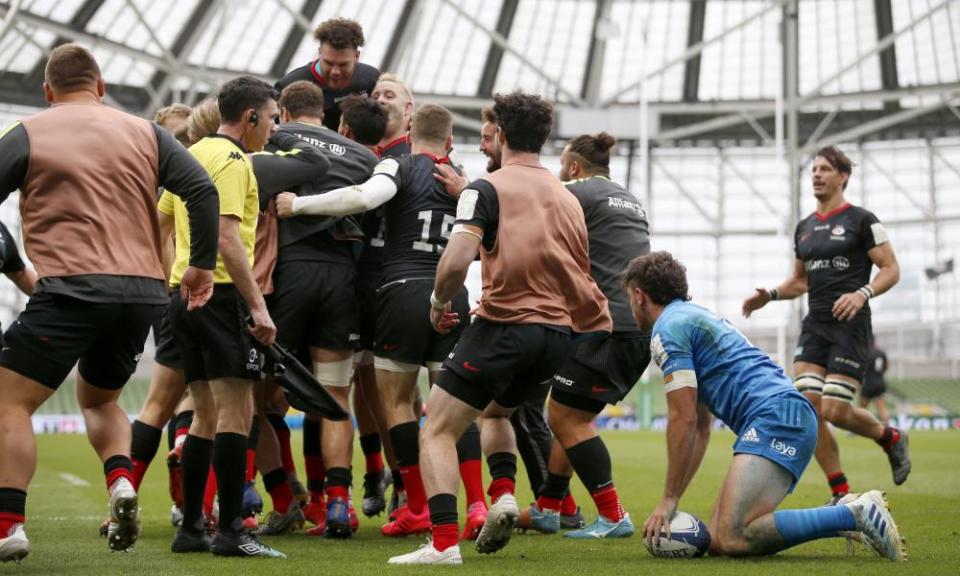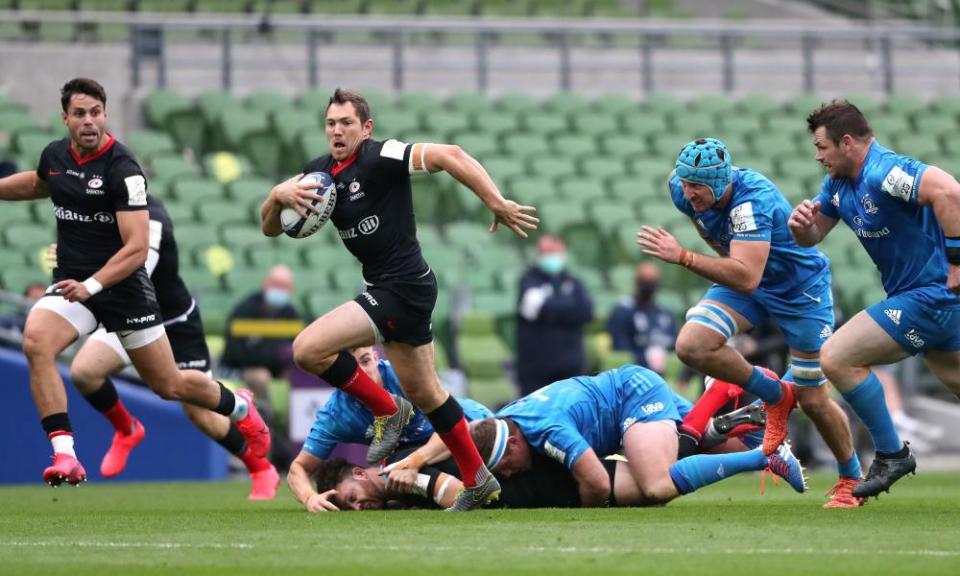Alex Goode delivers as Saracens keep chasing Champions Cup miracle

A dejected Leinster supporter was to the point a few hours after his side’s Champions Cup quarter-final defeat to the holders. “I don’t like Saracens, the way they play or the manner in which they conduct themselves,” he said. “But hats off to them: much as I do not like to admit it, that was one of the best performances I have ever seen in any sport.”
Saracens may have won the Champions Cup in three of the last four seasons, beating Saturday’s semi-final opponents Racing 92 in Lyon four years ago to take home the trophy for the first time, but they were rank outsiders in Dublin having seen 10 players either leave or go out on loan during lockdown and lost Owen Farrell to suspension.
They are no more fancied this weekend in Paris, where Racing promise to be stronger up front than Leinster were, and relentlessly physical with Finn Russell scanning for any gaps that open up. Were Saracens to retain the trophy, it would rank alongside Liverpool’s 2005 Champions League success in its defiance of the odds.
Related: New lockdown measures could leave Saracens in limbo for next season
Saracens showed grit, courage and commitment in Dublin, but when in the last 10 years have they not when it mattered? A difference was that the depleted ranks left them light on the bench: only four replacements were used, the first coming on with 17 minutes to go when their opponents had already deployed five.
The victory was also laced with skill, not least the try created and scored by Alex Goode, who had moved from full-back to outside-half to cover the absence of Farrell. Goode is entering the twilight of his career, 33 next year, and highly unlikely to add to his 21 England caps – a player whose Test career was quickly halted by Eddie Jones.
Goode sat on the bench for Jones’s first game as head coach against Scotland at Murrayfield and did not leave it until the match had finished. He came on for the full-back Mike Brown with 11 minutes to go in Rome in the next round, was unused against Ireland in the third and made way when Manu Tuilagi returned from injury.
He went on the 2016 summer tour to Australia but did not feature in any of the three Tests. He started against Fiji the following November, scoring one of England’s nine tries, but has not featured since. Jones always refuses to discuss why a player has been omitted or what they have to do to get into the squad, but Mike Brown was nailed on as the starting full-back then, considered to be the quicker and more durable of the two.

Goode is known as “the spider” at Saracens because of his deceptive running and while he was never a rival to Farrell or George Ford for the No 10 position, under Stuart Lancaster he was often used as a second receiver from full-back, a playmaker who could create space, as he did at the Aviva Stadium last weekend.
Jones has spoken recently of his desire for instinctive players, especially at half-back, as the game speeds up and Goode is a player who sees a play clearly and early. What he may lack in sheer speed, he compensates for in skill and awareness, which is why he has been a bedrock of one of the leading clubs in Europe in the last decade.
Saracens needed his try in Dublin, scored just before the interval. It gave them a 22-3 lead, enough of a cushion to withstand the expected Leinster response after the break. Something similar will be needed again under the closed roof of Racing’s ground in La Défense, a stadium that could have been named for Saracens given what their game has long been based on.
Related: Wasps chief warns of drastic cuts in rugby union without government help
Saracens were there 10 months ago for the opening game of their Champions Cup defence. Eleven days earlier they had learned of their 35-point deduction for breaching the Premiership’s salary cap regulations. They fielded a team that included only two of the starters who ran out against Leinster, Sean Maitland and Jackson Wray, and were thumped 30-10.
When they played Racing in the return at Allianz Park in January, they had just been docked another 70 points, ensuring they would be relegated to the Championship. The players knew the squad would be broken up as a consequence and that the Champions Cup was all they had to play for. Will Skelton, an early replacement for the injured Billy Vunipola, was sent off just before half-time when Saracens trailed 21-17.
They only conceded three more points after the break and scored 10 of their own to earn the date in Dublin. It was a performance that summed up Saracens, like their victory at Gloucester the previous November days after their original points deduction had been announced. They are never more dangerous than when they are in a corner.
It was not the bench that mattered in Dublin but the starting line-up. The lack of a crowd worked to Saracens’ advantage, not least when a replay of Michael Rhodes’s high tackle on Johnny Sexton was replayed on the big screen. The indignation of 50,000 voices may have persuaded the referee Pascal Gaüzère to reach for a card, but given past form, they would probably still have prevailed.
When Saracens were punished for their salary cap breaches, there were calls for them to be stripped of the league titles they won in those years. One of the arguments was that they had procured them through cheating. Last weekend was the latest instance since that affair concluded that they may well have won them anyway. They are about the how, not the who.
This is an extract from our weekly rugby union email, the Breakdown. To subscribe, just visit this page and follow the instructions.

 Yahoo Sport
Yahoo Sport 





































